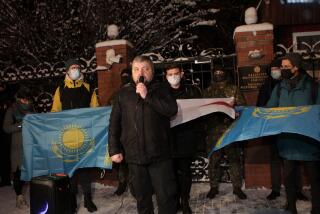Jacek Kuron, 70; Polish Activist Fought Communism, Was Aide to Solidarity Union’s Walesa
- Share via
WARSAW — Jacek Kuron, one of Poland’s most prominent anti-Communist activists, died Thursday in a Warsaw hospital after a long illness. He was 70.
Kuron also assisted shipyard workers in founding the Solidarity trade union movement in Gdansk in August 1980, and was a key advisor to Lech Walesa, the movement’s leader and later the president of Poland.
According to Walesa, without Kuron, many of the democratic changes in Poland would have been impossible or would have taken much longer.
“During the time of struggle, he was an unquestionable leader,” Walesa said Thursday. “He was simply the best. He fought with the system, with stupidity. I admired him, although under democracy our opinions differed.”
Polish President Aleksander Kwasniewski said that Kuron always fought to make the world a more just place and noted that the activist “contributed greatly to building Polish democracy and freedom. His place in history and in the hearts of Poles is very special.”
Kuron spent years in prison under the communist system and had been portrayed by the then-totalitarian regime as an archvillain who wanted to destabilize Polish society. He became one of the most trusted and loved politicians in democratic Poland.
Kuron served as labor minister in the country’s first non-communist government and became its leading spokesman at the time of painful economic reforms. In his weekly TV broadcasts, dressed in his trademark blue-denim jacket, he explained to his countrymen what capitalism was all about and tried to put a human face on it.
He introduced welfare payments for the unemployed, and became famous for donning a chef’s hat and serving soup to the poor in the streets of Warsaw.
In 1995, Kuron unsuccessfully ran for president. As his health declined in recent years, he was rarely seen in public.
Kuron was born March 3, 1934, in what was then the Polish city of Lvov (now in Ukraine). After World War II, he supported communism and became a leader of the “Red Scouts,” a Stalinist version of the Boy Scout movement.
He joined the Communist Party, but was expelled in 1964 for openly questioning its policies and human rights abuses. In 1976, following workers’ protests in Ursus and Radom, Kuron helped found KOR (Committee for the Defense of Workers), an organization openly assisting the jailed and beaten strikers. He was imprisoned many times for his activities, and secret police followed him everywhere. He was interned after the 1981 martial law crackdown by then-communist strongman Gen. Wojciech Jaruzelski.
After Kuron’s release from prison in 1984, his Warsaw apartment became the main information center on martial law abuses and was well-known to opposition activists and foreign correspondents.
Kuron is survived by his wife, Danuta, and a son, Maciej.
More to Read
Sign up for Essential California
The most important California stories and recommendations in your inbox every morning.
You may occasionally receive promotional content from the Los Angeles Times.













